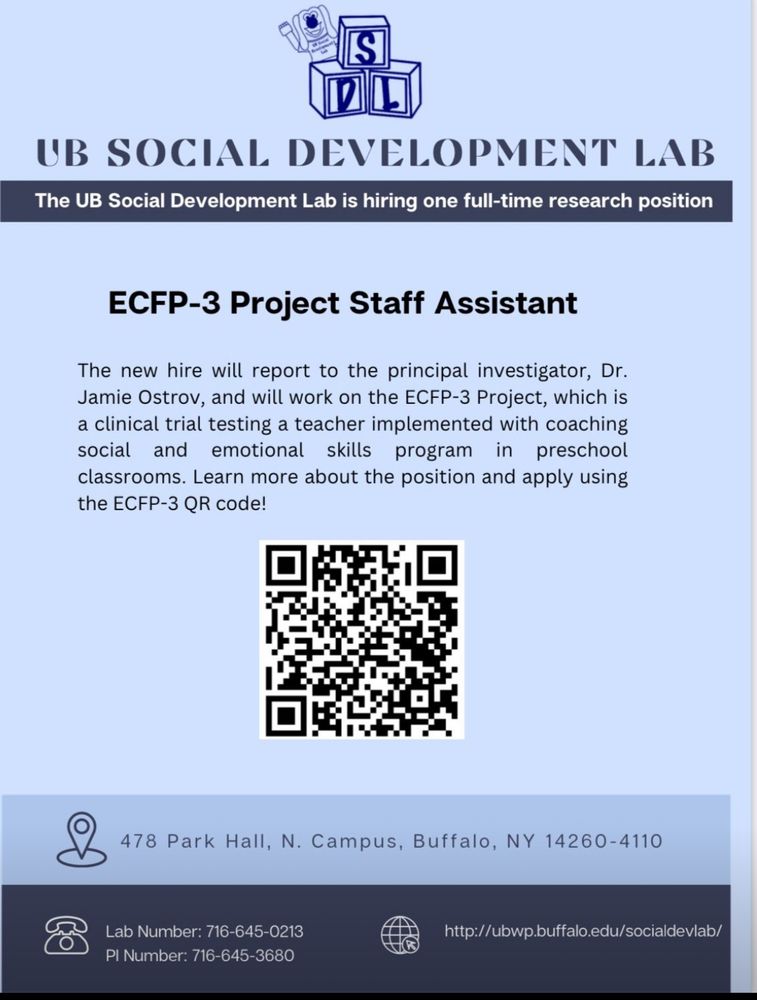
Social Development
@socialdevelopment.bsky.social
Social Development is a developmental psychology journal focused on developmental process, particularly during childhood and adolescence, as seen from a psychological stance. Here we share highlights from recently published papers.
Interested in measuring Big Five personality traits in upper-elementary students? Qingqing Du and colleagues adapted and validated a brief questionnaire among Chinese children with proved reliability and validity. Out now in our Methods Articles section
onlinelibrary.wiley.com/doi/10.1111/...
onlinelibrary.wiley.com/doi/10.1111/...

Mapping Young Minds: Adapting and Validating a Brief Big Five Inventory for Chinese Children in Upper Elementary School
This paper describes the adaptation and validation of a brief Big Five Inventory for upper elementary school children in China. Two independent samples, comprising 1884 and 2245 children from Grade 4...
onlinelibrary.wiley.com
September 21, 2025 at 9:15 AM
Interested in measuring Big Five personality traits in upper-elementary students? Qingqing Du and colleagues adapted and validated a brief questionnaire among Chinese children with proved reliability and validity. Out now in our Methods Articles section
onlinelibrary.wiley.com/doi/10.1111/...
onlinelibrary.wiley.com/doi/10.1111/...
In a new paper, Payton Nault and Michele Morningstar demonstrate that hat hostile attribution bias is linked to youth’s evaluation of tone of voice when selecting responses to peer provocation
onlinelibrary.wiley.com/doi/10.1111/...
onlinelibrary.wiley.com/doi/10.1111/...
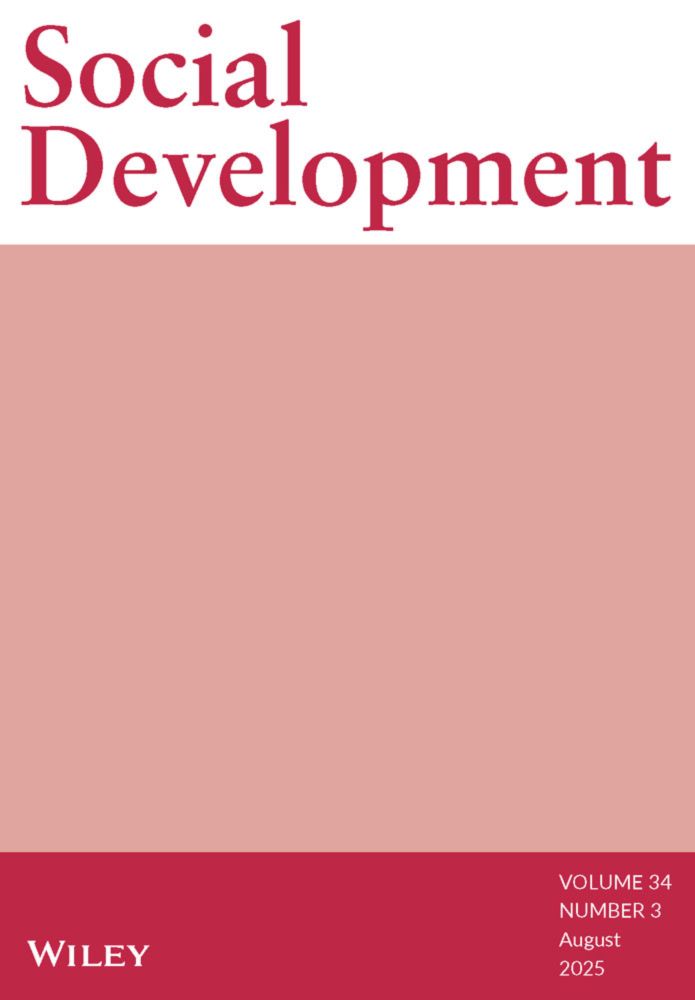
Hostile Attribution Biases and Evaluation of Vocally Enacted Responses to Peer Provocation in Early Adolescents
Hostile Attribution Bias (HAB) is the tendency to perceive ambiguous social information as threatening. The social information processing (SIP) model provides a theoretical framework for determining ....
onlinelibrary.wiley.com
July 1, 2025 at 4:16 AM
In a new paper, Payton Nault and Michele Morningstar demonstrate that hat hostile attribution bias is linked to youth’s evaluation of tone of voice when selecting responses to peer provocation
onlinelibrary.wiley.com/doi/10.1111/...
onlinelibrary.wiley.com/doi/10.1111/...
Anja Game and colleagues ask “Can You Make Me Laugh?” and show how toddlers and parents coordinate smiles and laughter during play. Smiling and laughter of both interaction partners influences the amount, intensity and timing of shared positive expressions.
onlinelibrary.wiley.com/doi/full/10....
onlinelibrary.wiley.com/doi/full/10....

Can You Make Me Laugh? Toddlers’ and Parents’ Shared Positive Expressions in Playful Interactions
Laughter and smiling are frequently experienced in social settings, yet more research is required to delineate their development and dynamics. We investigated toddlers’ and parents’ shared positive e...
onlinelibrary.wiley.com
June 30, 2025 at 8:21 AM
Anja Game and colleagues ask “Can You Make Me Laugh?” and show how toddlers and parents coordinate smiles and laughter during play. Smiling and laughter of both interaction partners influences the amount, intensity and timing of shared positive expressions.
onlinelibrary.wiley.com/doi/full/10....
onlinelibrary.wiley.com/doi/full/10....
Publication alert! A 4-year longitudinal study by Xiyuan Xu and Lijn Zhang illustrates the complex interplay between temperament and culture in the development and differentiation of shyness in childhood.
onlinelibrary.wiley.com/doi/full/10....
onlinelibrary.wiley.com/doi/full/10....

Temperament, Parenting, and Trajectories of Anxious and Regulated Shyness in Chinese Children: A 4‐Year Longitudinal Study
Anxious shyness refers to social inhibition and wariness toward familiar peers or authority figures, possibly due to concerns about negative social evaluation. In contrast, regulated shyness is chara...
onlinelibrary.wiley.com
June 30, 2025 at 5:01 AM
Publication alert! A 4-year longitudinal study by Xiyuan Xu and Lijn Zhang illustrates the complex interplay between temperament and culture in the development and differentiation of shyness in childhood.
onlinelibrary.wiley.com/doi/full/10....
onlinelibrary.wiley.com/doi/full/10....
Children’s animated films inaccurately and consistently portray predators as male and prey as female. Young children learn and maintain these gender stereotypes into adulthood.
See thread by @larawood.bsky.social or read the whole paper
onlinelibrary.wiley.com/doi/full/10....
See thread by @larawood.bsky.social or read the whole paper
onlinelibrary.wiley.com/doi/full/10....

Mr Predator and Mrs Prey: Gender Stereotypes in Children's Films Correlate With Explicit and Implicit Gender Stereotyping
Children acquire gender stereotypes at a young age and these subsequently influence cognition and behavior. Stereotypes may be learned through a child's direct observation of gender differences as we...
onlinelibrary.wiley.com
June 2, 2025 at 4:23 AM
Children’s animated films inaccurately and consistently portray predators as male and prey as female. Young children learn and maintain these gender stereotypes into adulthood.
See thread by @larawood.bsky.social or read the whole paper
onlinelibrary.wiley.com/doi/full/10....
See thread by @larawood.bsky.social or read the whole paper
onlinelibrary.wiley.com/doi/full/10....
New paper out by Hye-Young Yun, showing that coexisting classroom norms independently and interactively shape peers’ rejection and tolerance of bullying behavior.
onlinelibrary.wiley.com/doi/full/10....
onlinelibrary.wiley.com/doi/full/10....

Rejection or Tolerance of Bullies: The Roles of Descriptive, Injunctive, and Popularity Norms
Using data from a large sample of students (N = 1373; 40% girls; Mage = 14 years) from 54 classrooms, this study examines how multiple coexisting classroom norms—specifically, descriptive, injunctive...
onlinelibrary.wiley.com
May 26, 2025 at 4:48 AM
New paper out by Hye-Young Yun, showing that coexisting classroom norms independently and interactively shape peers’ rejection and tolerance of bullying behavior.
onlinelibrary.wiley.com/doi/full/10....
onlinelibrary.wiley.com/doi/full/10....
Reposted by Social Development
Social Development (a peer-reviewed journal specializing in developmental psychology; focusing on the developmental processes during childhood & adolescence, offering insights into how individuals grow & change over time) has moved to Bluesky (657 followers)
Bluesky: @socialdevelopment.bsky.social
Bluesky: @socialdevelopment.bsky.social
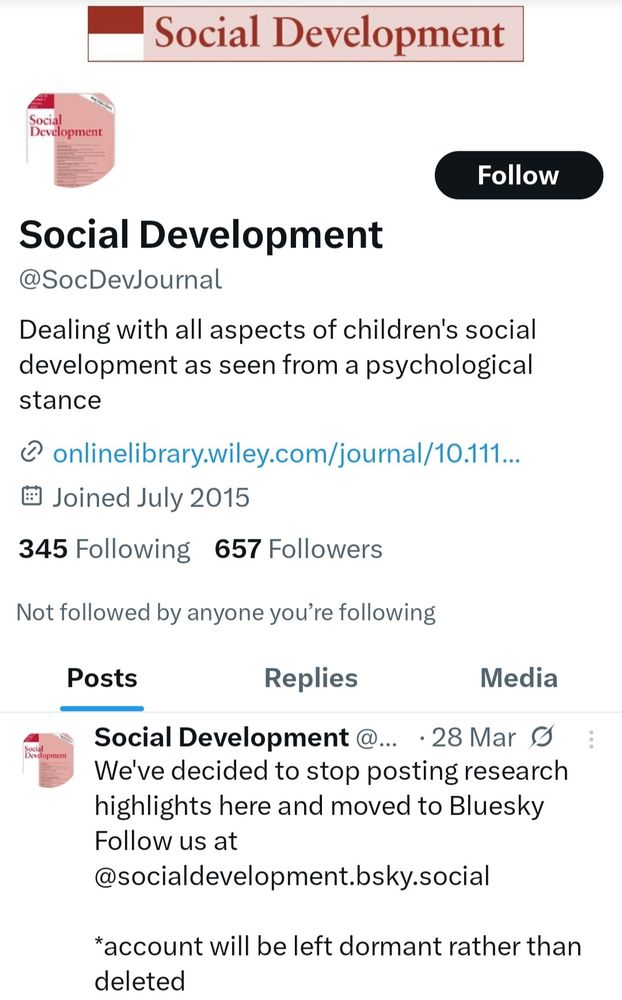
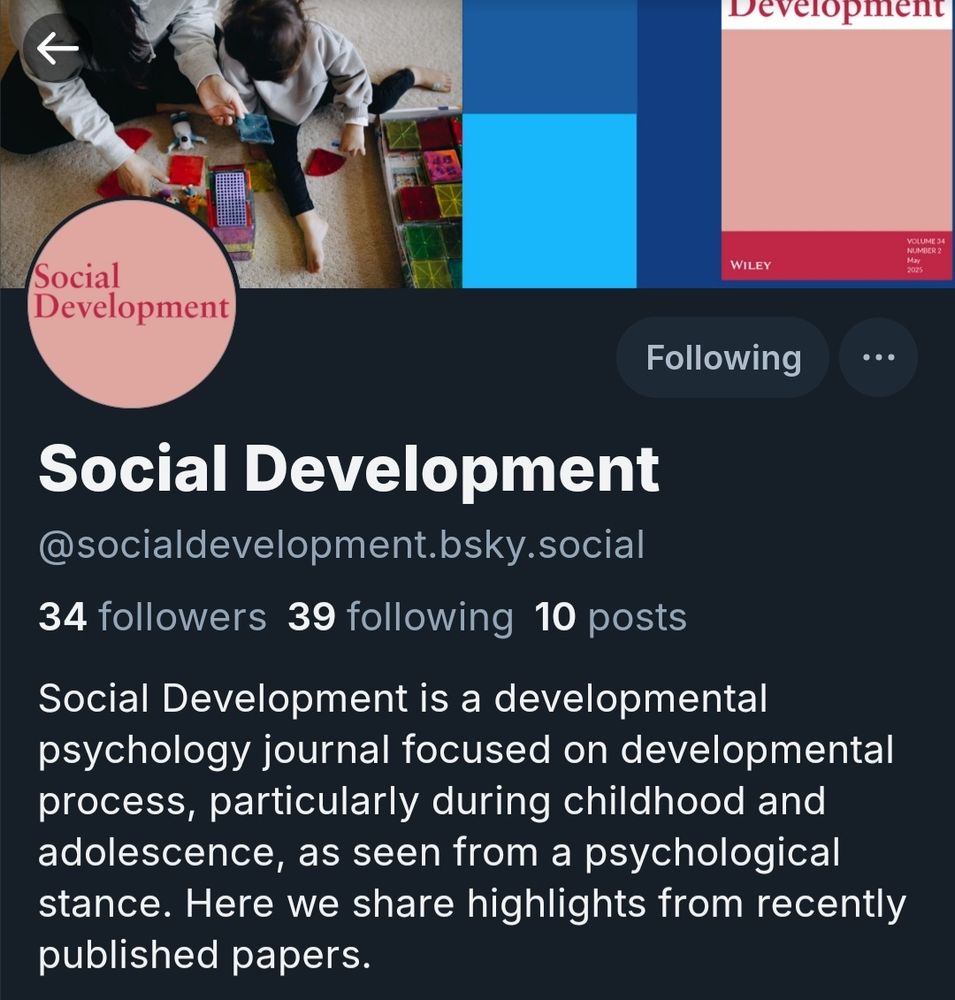
May 23, 2025 at 1:04 PM
Social Development (a peer-reviewed journal specializing in developmental psychology; focusing on the developmental processes during childhood & adolescence, offering insights into how individuals grow & change over time) has moved to Bluesky (657 followers)
Bluesky: @socialdevelopment.bsky.social
Bluesky: @socialdevelopment.bsky.social
Just out: New study by Clapham and colleagues reveals associations between adolescent friendship quality and social behavior differ by gender and levels of need for approval. onlinelibrary.wiley.com/doi/full/10....

Differential Susceptibility to Friendship Quality: The Role of Need for Approval
Friendships assume a salient role in well-being during mid-adolescence. This research examined (a) how friendship quality (stressful vs. supportive) is differentially associated with mid-adolescents’....
onlinelibrary.wiley.com
May 19, 2025 at 3:36 AM
Just out: New study by Clapham and colleagues reveals associations between adolescent friendship quality and social behavior differ by gender and levels of need for approval. onlinelibrary.wiley.com/doi/full/10....
So much cool work out in SoDe, including a super interesting study by lmcguire.bsky.social and nadirafaber.bsky.social who show that adolescents are more speciesist than adults and believe that farmed animals ought to be treated less well than adults do.
onlinelibrary.wiley.com/doi/full/10....
onlinelibrary.wiley.com/doi/full/10....

How Should We Treat Farmed Animals? Adolescents Are More Speciesist Than Adults
Adults engage in psychological processes (including species-based categorisation and post-hoc reasoning) that result in ascribing high moral value to some animals while eating others. Do adolescents ...
onlinelibrary.wiley.com
May 12, 2025 at 9:02 PM
So much cool work out in SoDe, including a super interesting study by lmcguire.bsky.social and nadirafaber.bsky.social who show that adolescents are more speciesist than adults and believe that farmed animals ought to be treated less well than adults do.
onlinelibrary.wiley.com/doi/full/10....
onlinelibrary.wiley.com/doi/full/10....
Excited that Ger et al.’s paper is out. Based on picture categories, they find that children find others’ misfortune funnier than adults.
onlinelibrary.wiley.com/doi/full/10....
onlinelibrary.wiley.com/doi/full/10....

Children Find Others’ Misfortune Funnier Than Adults
This study investigated the perceived funniness of misfortune in children and adults, examining the role of the misfortune victims’ facial expressions. Participants included 100 psychology undergradu...
onlinelibrary.wiley.com
May 12, 2025 at 8:59 PM
Excited that Ger et al.’s paper is out. Based on picture categories, they find that children find others’ misfortune funnier than adults.
onlinelibrary.wiley.com/doi/full/10....
onlinelibrary.wiley.com/doi/full/10....
Reposted by Social Development
#HURRAH! 🐧
Ebru Ger and @mirellamanfredi.bsky.social's time together in our working group resulted in a very nice study on the #development of #humour:
Children Find Others’ Misfortune Funnier Than Adults
@socialdevelopment.bsky.social
onlinelibrary.wiley.com/doi/10.1111/...
Ebru Ger and @mirellamanfredi.bsky.social's time together in our working group resulted in a very nice study on the #development of #humour:
Children Find Others’ Misfortune Funnier Than Adults
@socialdevelopment.bsky.social
onlinelibrary.wiley.com/doi/10.1111/...
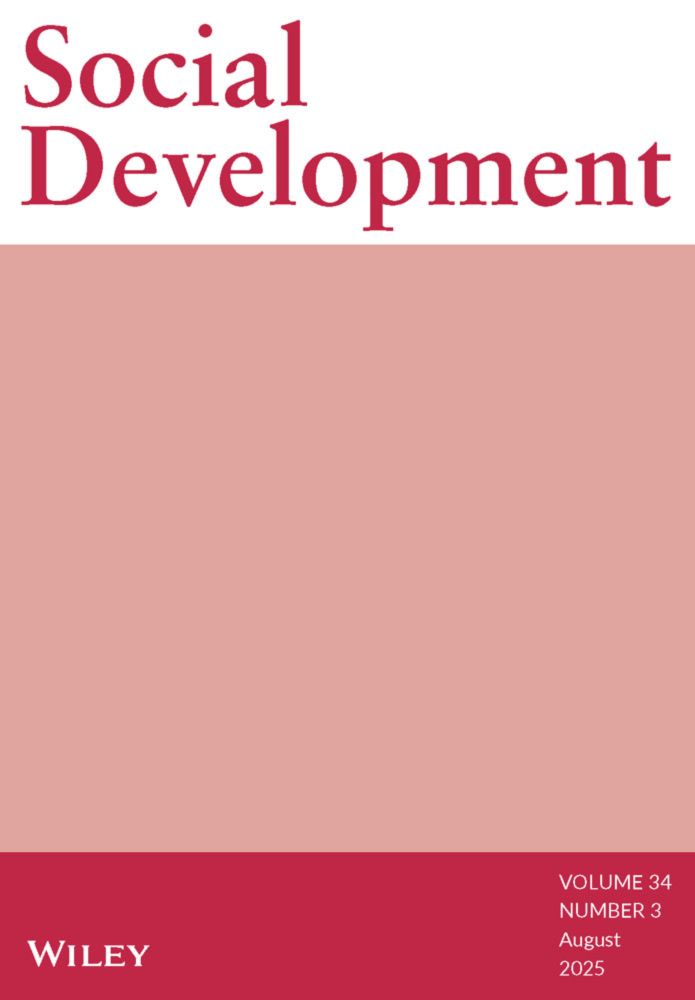
Children Find Others’ Misfortune Funnier Than Adults
This study investigated the perceived funniness of misfortune in children and adults, examining the role of the misfortune victims’ facial expressions. Participants included 100 psychology undergradu....
onlinelibrary.wiley.com
May 7, 2025 at 4:20 PM
#HURRAH! 🐧
Ebru Ger and @mirellamanfredi.bsky.social's time together in our working group resulted in a very nice study on the #development of #humour:
Children Find Others’ Misfortune Funnier Than Adults
@socialdevelopment.bsky.social
onlinelibrary.wiley.com/doi/10.1111/...
Ebru Ger and @mirellamanfredi.bsky.social's time together in our working group resulted in a very nice study on the #development of #humour:
Children Find Others’ Misfortune Funnier Than Adults
@socialdevelopment.bsky.social
onlinelibrary.wiley.com/doi/10.1111/...
New paper alert! Hartwell and colleagues show that young children can adjust their reasoning ‘in the moment’ and adapt to new evidence they receive. They can use indirect evidence to make inferences that inform their decision-making.
onlinelibrary.wiley.com/doi/full/10....
onlinelibrary.wiley.com/doi/full/10....

Young Children Use Direct and Indirect Evidence in Their Inferential Reasoning
To reach rational conclusions, we often draw inferences about the evidence that supports one solution over another. This evidence can be direct and indicate why one option is correct, or indirect and...
onlinelibrary.wiley.com
May 12, 2025 at 8:57 PM
New paper alert! Hartwell and colleagues show that young children can adjust their reasoning ‘in the moment’ and adapt to new evidence they receive. They can use indirect evidence to make inferences that inform their decision-making.
onlinelibrary.wiley.com/doi/full/10....
onlinelibrary.wiley.com/doi/full/10....
Check out this paper by Planalp and colleagues who show that empathy, while essential in human relationships, can be a risky strength, as it may lead to personal distress and higher depressive risk.
onlinelibrary.wiley.com/doi/full/10....
onlinelibrary.wiley.com/doi/full/10....
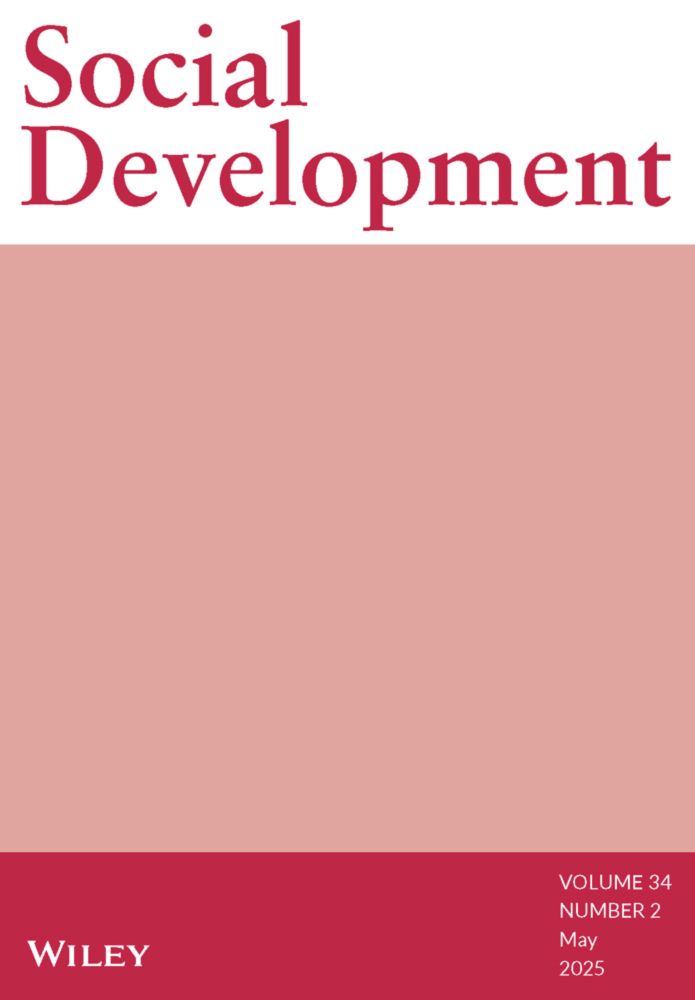
Empathy as a Risky Strength: Associations With Parent and Child Depressive Symptoms in Middle Childhood
Healthy human relationships incorporate empathy; yet empathy may sometimes be a risky strength. Here we examine whether links between parent and child depressive symptoms are moderated by child empat...
onlinelibrary.wiley.com
April 26, 2025 at 5:54 AM
Check out this paper by Planalp and colleagues who show that empathy, while essential in human relationships, can be a risky strength, as it may lead to personal distress and higher depressive risk.
onlinelibrary.wiley.com/doi/full/10....
onlinelibrary.wiley.com/doi/full/10....
New work by Morales showing that family SES shapes children's ToM via educational stimulation and maternal mental talk during free play. Children's ToM varies by context and assessment method; storytelling elicits richer mental talk than free play.
onlinelibrary.wiley.com/doi/abs/10.1...
onlinelibrary.wiley.com/doi/abs/10.1...
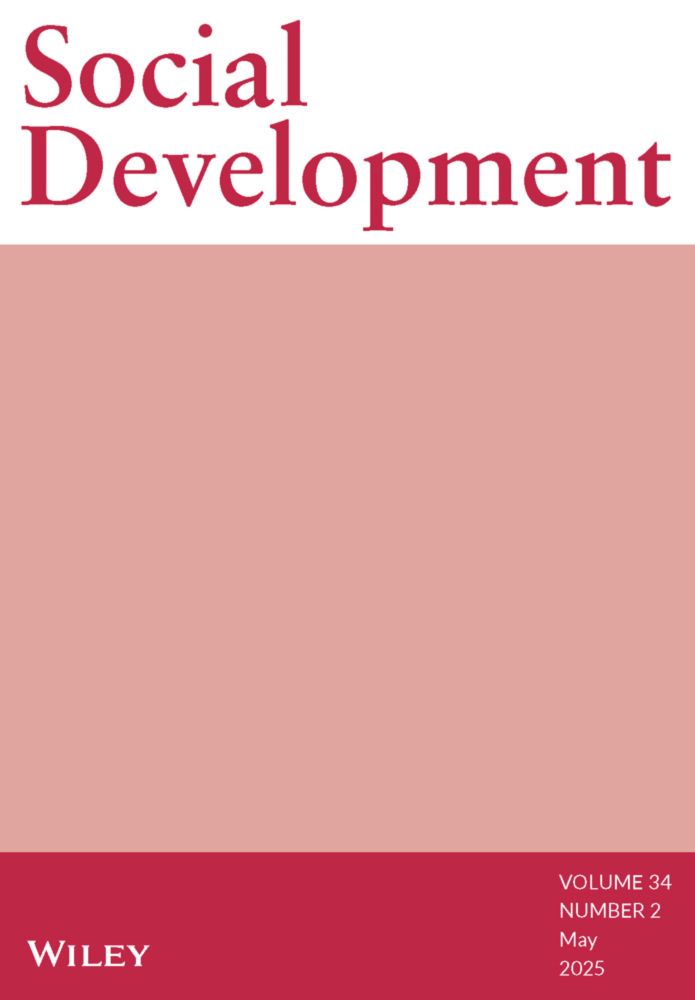
Children's Theory of Mind and Family Socioeconomic Status: What Can Different Approaches and Contexts Tell Us About the Same Construct?
Children's theory of mind (ToM) is a crucial milestone in early childhood, with implications for prosocial behaviours and cognitive skills in later years. Therefore, it is important to characterise c...
onlinelibrary.wiley.com
April 8, 2025 at 6:47 AM
New work by Morales showing that family SES shapes children's ToM via educational stimulation and maternal mental talk during free play. Children's ToM varies by context and assessment method; storytelling elicits richer mental talk than free play.
onlinelibrary.wiley.com/doi/abs/10.1...
onlinelibrary.wiley.com/doi/abs/10.1...
Happy to share this new paper by Qinglu Wu et al. They found that Chinese parents perceive gratitude as multifaceted, including gratitude toward the motherland, benefactors, and family, with an emphasis on reciprocity and giving back to society.
onlinelibrary.wiley.com/doi/10.1111/...
onlinelibrary.wiley.com/doi/10.1111/...

Chinese Parents’ Understanding and Socialization of Gratitude
Extant research on parents’ understanding of gratitude and the socialization of gratitude in children has primarily been conducted in Western cultural contexts. To address this gap, this interview-ba...
onlinelibrary.wiley.com
April 2, 2025 at 7:01 AM
Happy to share this new paper by Qinglu Wu et al. They found that Chinese parents perceive gratitude as multifaceted, including gratitude toward the motherland, benefactors, and family, with an emphasis on reciprocity and giving back to society.
onlinelibrary.wiley.com/doi/10.1111/...
onlinelibrary.wiley.com/doi/10.1111/...
Just out in Social Development! Ambrish et al show that children use features of speech to determine who a speaker is addressing. Both mono- and bilingual children like people who they believed spoke “correctly”.
@zoeliberman.bsky.social
onlinelibrary.wiley.com/doi/abs/10.1...
@zoeliberman.bsky.social
onlinelibrary.wiley.com/doi/abs/10.1...

Does Children's Developing Understanding of Linguistic Register Impact Their Social Preferences?
People use different communication patterns based on the context and who they are addressing. These differences, known as linguistic register, are common across human speech and recognized early in d...
onlinelibrary.wiley.com
April 1, 2025 at 7:41 AM
Just out in Social Development! Ambrish et al show that children use features of speech to determine who a speaker is addressing. Both mono- and bilingual children like people who they believed spoke “correctly”.
@zoeliberman.bsky.social
onlinelibrary.wiley.com/doi/abs/10.1...
@zoeliberman.bsky.social
onlinelibrary.wiley.com/doi/abs/10.1...
Wonderful new work from Eliot et al. who meta-analysed studies on gender differences in infant social perception. Whereas such differences are often claimed to be innately determined, the authors did did not find evidence for the first months of life.
onlinelibrary.wiley.com/doi/10.1111/...
onlinelibrary.wiley.com/doi/10.1111/...
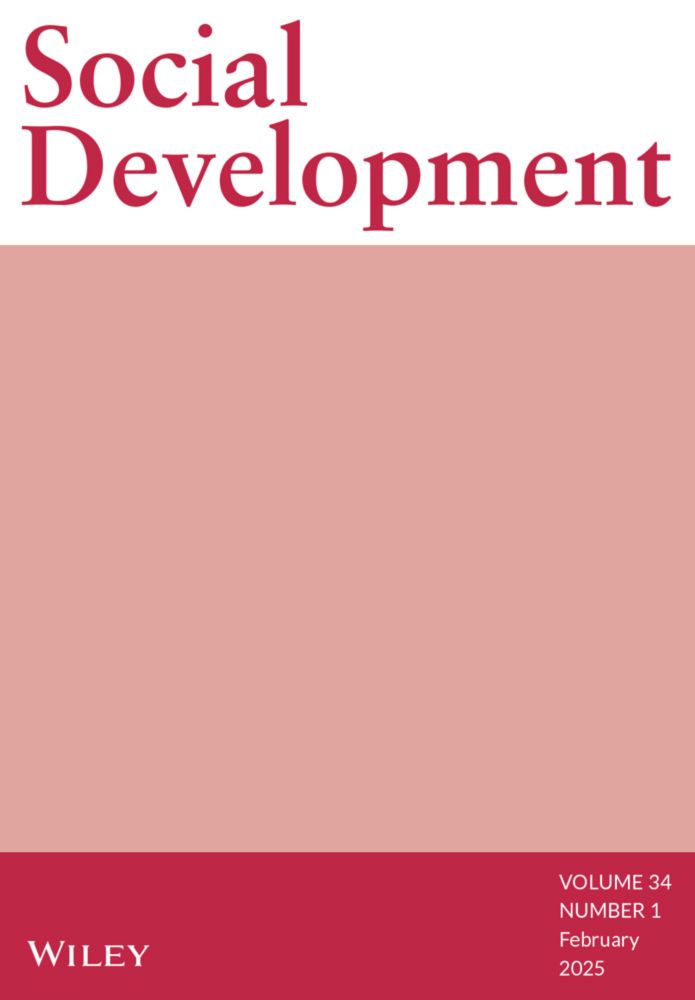
Systematic Review and Meta‐Analyses Reveal no Gender Difference in Neonatal Social Perception
Women score higher than men on measures of social cognition such as empathy and reading non-verbal cues. How early does this gender difference emerge? Systematic review and meta-analyses were used to....
onlinelibrary.wiley.com
March 29, 2025 at 7:34 AM
Wonderful new work from Eliot et al. who meta-analysed studies on gender differences in infant social perception. Whereas such differences are often claimed to be innately determined, the authors did did not find evidence for the first months of life.
onlinelibrary.wiley.com/doi/10.1111/...
onlinelibrary.wiley.com/doi/10.1111/...
Reposted by Social Development
New paper alert! Research on children in Japan shows that 6-year-olds apply stricter punishment to repeat than 1st-time offender. This suggests that from the early stages of punitive behaviour development, earlier transgressions are taken into account.
onlinelibrary.wiley.com/doi/full/10....
onlinelibrary.wiley.com/doi/full/10....

Repeated Transgressions Promote Costly Third‐Party Punishment in 6‐Year‐Olds
Individuals across cultures believe repeat offenders deserve greater punishment than first-time offenders, which is also widely accepted in today's judicial system. Although previous studies indicate...
onlinelibrary.wiley.com
March 28, 2025 at 8:23 AM
New paper alert! Research on children in Japan shows that 6-year-olds apply stricter punishment to repeat than 1st-time offender. This suggests that from the early stages of punitive behaviour development, earlier transgressions are taken into account.
onlinelibrary.wiley.com/doi/full/10....
onlinelibrary.wiley.com/doi/full/10....
Reposted by Social Development
I’m excited that @socialdevelopment.bsky.social (edited by @doctinak.bsky.social, @harriet-tenenbaum.bsky.social, & me) is now on Bluesky! Follow us for current news about the journal and our latest published research.
March 13, 2025 at 9:35 PM
I’m excited that @socialdevelopment.bsky.social (edited by @doctinak.bsky.social, @harriet-tenenbaum.bsky.social, & me) is now on Bluesky! Follow us for current news about the journal and our latest published research.
Reposted by Social Development
These recommendations have now been endorsed by @icpsr.bsky.social, @sociologicalsci.bsky.social, @gawc.bsky.social, @socialdevelopment.bsky.social, @networkscijournal.bsky.social, @yrcss.bsky.social and many others.
Learn more and become an endorser at www.zacharyneal.com/datasharing
Learn more and become an endorser at www.zacharyneal.com/datasharing
March 13, 2025 at 1:30 PM
These recommendations have now been endorsed by @icpsr.bsky.social, @sociologicalsci.bsky.social, @gawc.bsky.social, @socialdevelopment.bsky.social, @networkscijournal.bsky.social, @yrcss.bsky.social and many others.
Learn more and become an endorser at www.zacharyneal.com/datasharing
Learn more and become an endorser at www.zacharyneal.com/datasharing



